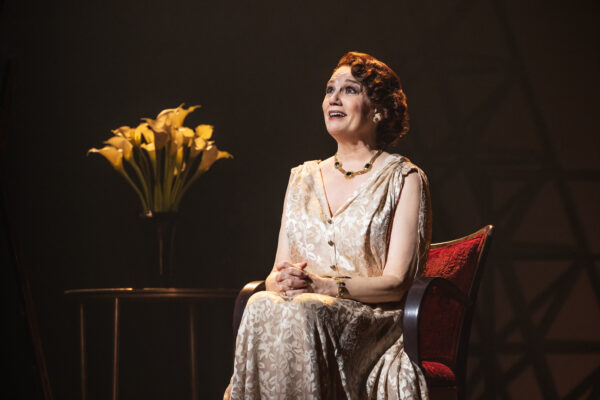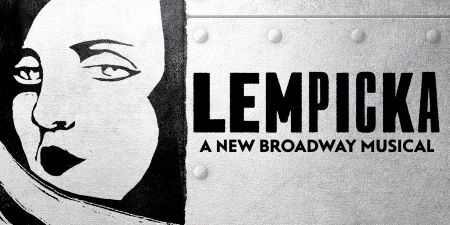REIGNITING TAMARA DE LEMPICKA
An epic story of entangled triangles is taking place at the Longacre Theatre, where a happily married young woman falls in love with another young woman, a sex worker. If that isn’t scandalous enough for 1920, let’s add that our heroine’s commitment is to her husband, her passion to her new lover, but her heart is completely devoted to art (and the comfortable lifestyle that fame grants.) Featuring Mariand Torres (covering for Eden Espinosa) as renowned Polish painter Tamara de Lempicka, Amber Iman as the sensual Rafaela, and charming Andrew Samonsky as Tadeusz Lempicki, Tamara’s husband, this musical feels like a long, engaging music video.
Amber Iman and Eden Espinosa
Amber Iman
We meet a flamboyant Lempicka in Los Angeles in 1975, an old lady sitting on a bench, alone and overdressed under the white sky. She lets us know how much she has loved and lost: “I had the great good fortune to love not once, but twice. And, I had the great misfortune to love them both at the same time.” That’s where the prologue ends and the story starts: it’s 1916 and we are in St. Petersburg. Lempicka, in her early twenties, is wearing her wedding dress, about to get married. Born into a wealthy Jewish family, she is well-educated, loves to paint, and adores Tadeusz, her fiancée. A baby, Kizette (Zoe Glick), is born right away and the couple couldn’t be happier but the Russian revolution is at their door and the bubble quickly deflates.
The Cast
Campy dancers as Bolshevik’s fighters, choreographed by Raja Feather Kelly, stamp around the set with flags, singing slogans. Tadeusz is arrested, Lempicka is frantic. She begs to know where they took him, offering jewels in exchange for information but nobody helps her; to the liberators she is part of the rich class that vexed and tortured the poor for decades. They take her jewels and send her away; in the end, like Tosca, she finds a sexual predator who wants to rape her in exchange for Tadeusz’s freedom. She has no choice and the trauma changes her life; Mariand Torres’s voice is superb in both the low tragic parts and high pitch extended notes. She does not reflect the Garbo-glamour of the painter, one of the hardest things to achieve, but she fully inhabits the role and gives us an amazing performance without having rehearsed the part with the cast before the show.
George Abud
Fleeing the uprisings, the young family lands in Paris, under what looks like a rock version of the bottom of the Eiffel Tower. Riccardo Hernández’s abstract and austere sets and Paloma Young‘s structured but flowing costumes make us feel like we are attending a concert by Madonna that takes place in Metropolis, the 1927 sci-fi thriller by Fritz Lang. (Madonna has used Lempicka’s work and the look of its subjects in concerts and music videos.) The Bolshevik and Fascist propaganda and the angular looks offered by Bradley King‘s lights and Peter Nigrini‘s projections complete the futuristic picture.
The Cast
In Paris in 1918, at the end of World War I, Lempicka has to find a way to survive since her husband is still shocked by the prison ordeal and deeply depressed. Going back and forth between menial jobs, she notices street artists selling paintings for a lot more than she makes. Art is her true passion so she rushes to get paint and canvas, and enrolls in painting classes at the Académie, where insufferable Filippo Tommaso Marinetti is her teacher. In real life, artists Maurice Denis and André Lhote were her teachers but Carson Kreitzer, who co-wrote the musical with Matt Gould, decided to use the founder of the Futurist Movement to introduce utopia, love for machines, and the rise of fascism in the plot — a successful choice. George Abud plays Marinetti with enthusiasm and outstanding results.
 Beth Leavel
Beth LeavelLempicka‘s seductive portraits are different and immediately noted by Baron Raoul Kuffner (Nathaniel Stampley) and his dying wife (a touching and elegant Beth Leavel, who needed more comic material to make the role stand out). The art is painted with sharp lines and bold colors applied with flat, clean brushstrokes (“never let them see your brushstrokes”) that bring the subject of the painting to life. Lempicka gives women a self-assured gaze, a powerful modern look, and rich Parisian ladies like that.
Eden Espinosa
One night Lempicka meets Rafaela and her life changes again. The passion she feels toward the model-muse drives her to paint her most important nudes and explore her own sexuality. Gould’s eclectic music and Kreitzer’s lyrics include many disparate styles that suit Iman’s powerful voice like a glove, making her the star of the musical, a memorable interpreter. Her friend Suzy, played by an effervescent Natalie Joy Johnson, is the underground lesbian club owner, the only place where Limpicka sees Rafaela in public. The artist quickly becomes an icon of 1920s glittering Paris and, completely self-absorbed, she forgets her loyalties toward the people who love her, including her daughter Kizette, in order to keep her artist status and reputation in high society.
Natalie Joy Jonson and the Cast
Directed by Rachel Chavkin, Lempicka is a shining example of modern musicals, one that younger crowds may appreciate for Gould’s upbeat score and its style. The sound design by Peter Hylenski and Justin Stasiw is also clear and precise, and the music direction by Charity Wicks truly energetic. One thing to keep in mind is that this stylish musical is intentionally campy, not a bio-drama nor a feminist manifesto. The Russian Revolution and the rise of fascism, her motherhood or lack of, are not taken seriously; they are there to map the artist’s life, a complex journey full of passion, traumas and contradictions. Considered more of a character than an artist in her chauvinist world, she became an important painter of the early twentieth century but her fame faded with the years and the advent of a new World War. Maybe this show will help bring her art back, she certainly deserves it.
Eden Espinosa and Andrew Samonsky
photos by Matthew Murphy and Evan Zimmerman
Lempicka
Longacre Theatre, 220 W 48th St
open run ends on May 19, 2024
for tickets, visit Lempicka or Telecharge

